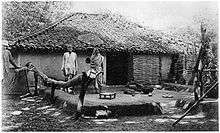Dhimar
 Dhimar or fisherman’s hut as depicted in Tribes and Castes of the Central Provinces of India, Volume II by Russell (1916)]] | |
| Regions with significant populations | |
|---|---|
| India |
Dhimar caste is a Hindu caste of India mainly residing in the Central Provinces. This caste is also known by several other names such as Kahar, Bhoi, Palewar, Baraua and Machhandar. Dhimar caste mainly comprises fishermen and palanquin-bearers. In some parts of the country the Bhois and the Dhimars are considered as distinct castes, but in the Central Provinces they are not distinguished and both these names are applied indiscriminately to the castes. It is believed that the name Bhoi is more particularly applied to those who carry palanquins whereas Dhimar is applied for fishermen. The term Dhimar is a version of the Sanskrit word `Dhivara`, meaning a fisherman.
Dhimar caste has several sub-divisions of occupational nature or of local nature. Among occupational names, mention can be made of Singaria, who cultivate the singara nut; Nadha, who live on the banks of streams; Bandhaiyas, who make ropes and sacking of hemp and fibre; Tankiwalas, sharpeners of grindstones; and Dhurias who sell parched rice. The caste also has several exogamous groups, either of titular or totemistic nature. Some of the names are Baghmar, a tiger-slayer; Ojhwa, from Ojha or sorcerer; Guru pahchan, who knows his teacher; Midoia, a guardian of boundaries; Gidhwe, a vulture; Kolhe, or jackal; and Kasture, musk and so on. Further, some of the names are from the names of towns or villages, such as Tumsare from Tumsar, Nagpurkar from Nagpur and others.
Dhimar caste is further divided into sub-castes like Nadha (residents of river banks); Singadia (cultivators of `singada` or water-nut); and Dhurias (dry-rice sellers). Traditional occupation of the Dhimars is fishing. Occasionally few members of this caste engage in cultivation. At times, the Dhimars make their living by selling sweet potatoes, dry grains and rice. The Dhimars have certain set rituals regarding marriage. They prohibit the marriage of members of same clan and also the marriages of first cousins. Widow re-marriage is allowed in Dhimar society. In their society, widow marriage is usually held during night time except on Tuesdays, Saturdays and Sundays. Divorce is also allowed however it is very rare. They bury the dead. In Dhimar society, children are either named on the day of the birth or on 12th day after birth. They are religious people and worship to Durga,Shiv,vishnu etc
References
- Citations
- Bibliography
- Shah, Pankaj (6 April 2013), "Political parties eye Lok Sabha polls, bank on boatmen to claim pole position", The Times of India, retrieved 14 April 2014
- Srivastava, Piyush (25 February 2014), "BJP castes a wider UP net, uses Modi's background to attract OBC votes while seeking blessings by feeding Brahmins", India Today, retrieved 14 April 2014
Further reading
- Béla Gunda (1984). The Fishing culture of the world: studies in ethnology, cultural ecology, and folklore. Akadémiai Kiadó. ISBN 978-963-05-3279-2.